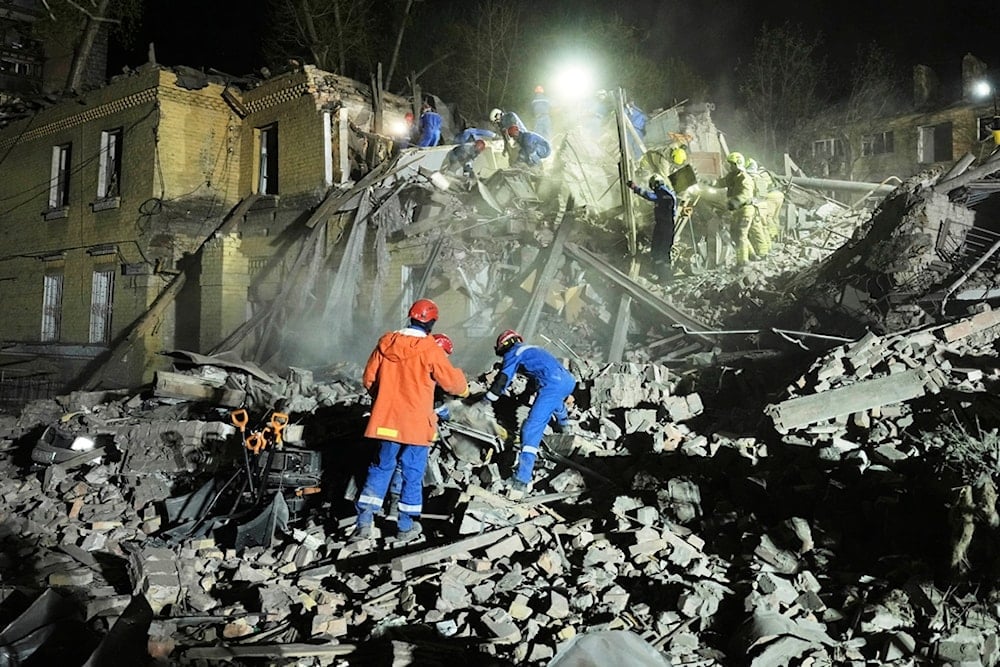'Vladimir, STOP!': Trump to Putin after Kiev strike
Donald Trump calls on Vladimir Putin to stop Russian missile strikes on Kyiv after the deadliest attack in months, raising tensions in ceasefire negotiations.
-

Ukrainian searchers clear the rubble after a Russian ballistic missile attack in Kyiv, Ukraine, early Thursday, April 24, 2025 (AP Photo/Efrem Lukatsky)
US President Donald Trump publicly urged Russian President Vladimir Putin to halt attacks on Ukraine after a deadly missile and drone barrage on Kiev.
The assault, one of the most severe in recent months, triggered an unusually direct condemnation from Trump, who called the strikes "not necessary" and said they had "bad timing."
"I am not happy with the Russian strikes on KYIV," Trump posted on social media. "Vladimir, STOP! Let's get the Peace Deal DONE!" His remarks came as Ukrainian President Volodymyr Zelensky appealed for stronger international action to end Russia's invasion.
Later today, US President Donald Trump said he believes that Russian President Vladimir Putin will hear his appeal to cease strikes in Ukraine.
“I do, yeah,” Trump told reporters at the White House when asked a relevant question.
Zelensky demands tougher sanctions
The attack forced Zelensky to cut short a trip to South Africa, returning to address the aftermath of what he described as "one of the most sophisticated, most brazen" assaults of the war. In a statement, Zelensky questioned whether Ukraine's allies were applying sufficient pressure on Russia to secure an unconditional ceasefire.
"I don't see any strong pressure on Russia or any new sanctions packages against Russia's aggression," he said, adding that the strikes must end immediately. The Ukrainian capital, though better defended than other cities, has experienced fewer deadly attacks since the war began three years ago.
Trump's envoy heads to Russia
Trump's latest statement comes amid fragile diplomatic efforts. His envoy, Steve Witkoff, is expected to arrive in Russia this week for discussions with Putin, marking his fourth visit since Trump returned to the White House in January. The talks aim to explore a possible peace agreement, though tensions remain over key issues such as the status of Crimea.
Earlier this week, Trump criticized Zelensky for refusing to accept Russian control of Crimea, which Moscow took over in 2014.
In response, Zelensky maintained that Ukraine could not violate its Constitution or legislation in any peace deal. "We do everything that our partners have proposed, only what contradicts our legislation and the Constitution we cannot do," he told reporters in South Africa.
Trump censures Zelensky
In a post shared on his Truth Social platform, Trump on Wednesday sharply criticized Zelensky for comments made in a recent Wall Street Journal interview, where Zelensky reaffirmed that Ukraine would not legally recognize Russia's occupation of Crimea.
Trump claimed that such a position is a major impediment to achieving a peace deal with Moscow. "Crimea was lost years ago under the auspices of President Barack Hussein Obama, and is not even a point of discussion," he wrote, suggesting that Kiev's refusal to accept Russia's control over Crimea ignored political realities and risks prolonging the conflict.
"Nobody is asking Zelenskyy to recognize Crimea as Russian Territory," Trump added, "but if he wants Crimea, why didn't they fight for it eleven years ago when it was handed over to Russia without a shot being fired?"
He warned that Zelensky's stance would only "prolong the 'killing field,'" and claimed that an agreement was within reach. "The man with 'no cards to play' should now, finally, GET IT DONE," Trump concluded.
Crimea deal
These remarks come as The Washington Post reported that Trump's team is drafting a peace proposal that would recognize Crimea as part of the Russian Federation and freeze the current front lines of the war.
The plan, expected to be discussed in upcoming meetings in London, would also offer phased sanctions relief to Moscow in exchange for a halt in hostilities, marking a dramatic shift from over a decade of US foreign policy.
The proposed framework, building on talks held recently in Paris, would ask Ukraine to forgo NATO membership and accept limited security guarantees, while formally abandoning claims to both Crimea and parts of the Donbas.
Ukrainian officials have already rejected this approach, pointing to constitutional barriers and a national consensus that prioritizes restoring sovereignty over all internationally recognized territories.
Read more: Trump expected to reveal Ukraine peace plan, including ceasefire

 4 Min Read
4 Min Read











